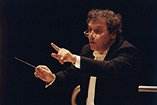S & H Concert Review
Berlioz, Chopin, Tchaikovsky Mikhael Pletnev (piano), Philharmonia Orchestra, Alexander Lazarev, 11th May, RFH (AR)
Whilst at first sight this programme appeared to be a bit hackneyed, consisting as it did of well-known favourites, the combination of the idiosyncratic Russian conductor Alexander Lazarev and his compatriot pianist, the volatile Mikhail Pletnev, turned it into an evening of inspired music making.
Lazarev opened the proceedings with an elegant performance of Hector Berliozís Overture, Le Corsaire, Op.21. Far from sounding like a bashed-out showpiece for orchestra, the conductorís reading was measured and refined, marrying lyricism with drama, with orchestral textures perfectly balanced and beautifully transparent, and wonderfully incisive punctuating trombones in the closing passages.
Before Mikhail Pletnev sat down he gave his piano stool a puzzled stare, then took out his handkerchief to wipe something off it, much to the amusement of a packed house. Fastidious comedy moment over, Pletnev switched mood, wearing a face of stern concentration as he prepared for Chopinís Piano Concerto No.1.
The first twenty-minute movement can often sound fragmented and heavy-textured, but under Lazarevís sensitive hands the music flowed effortlessly, with the Philharmonia playing with a chamber-like clarity. Pletnevís highly concentrated playing had great finesse and agility, floating his phrases with great lightness of touch and endowing the notes with a sparkling quality in the lyrical passages.
His dreamy Larghetto suggested the image of shooting stars as he flicked his wrists, seemingly throwing the notes into the air like gold dust. His sounds had a fragile, almost vulnerable quality, the movement ending on a solitary sublime note. Pletnev shifted mood in the Rondo playing with great brio and humour, aided and abetted by vigorous support from conductor and orchestra. Pletnev and Lazarev were an ideal match, each keeping a watchful eye on the other throughout this inspired performance which had the house in raptures.
Under Lazarevís vigorous direction, Tchaikovskyís Fourth Symphony was given a totally exhilarating, white-knuckle ride performance. For those who attended the polite and smooth-textured account of this symphony under Zubin Mehta with the Vienna Philharmonic Orchestra at the RFH last year Lazarevís reading would have seemed rough and ready.
However, this is not to say that Lazarevís account was undisciplined - far from it. Whereas Mehtaís was well-mannered and highly polished, it lacked the raw energy and essential manic quality that Lazarev brought to the work This was a great Russian conductor teaching an English orchestra to play with Russian passion. Conducting without a baton, he launched his forces into the Andante sostenuto even before the audience had settled down. His wild balletic gestures encouraged the Philharmonia to play with great intensity and bravura. In the reflective lyrical passages he held the strings in check making them play incredibly quietly allowing the poetically played woodwinds to be clearly heard. The Philharmonia were inspired to play with great feeling, but always perfectly controlled in this knife-edged reading.
After this tempestuous start, things calmed down with the Andantino, again played with great warmth and passion, with the strings being subtly subdued to allow some exquisite woodwind solos to shine through. The Scherzo was given a tougher performance than one normally hears, with pizzicato strings interrupted by capricious arabesques from the pointed woodwind; notably inspired was the piercing piccolo playing of Keith Bragg.
Lazarez increased the temperature in the Finale with the Philharmonia playing with feverish intensity, with powerful brass and percussion playing. As we got to the closing passages the orchestra seemed to be at boiling point, with the conductor leaping into the air to finish off the symphony, landing triumphantly facing the delighted audience.
Not since Bernstein have I seen such over-the-top conducting, but Lazarezís gestures were totally in the service of the score, and he surely got to the heart of Tchaikovskyís highly charged music. This was an evening of real music making with soloist, conductor and orchestra performing with superhuman energy to give us a truly memorable concert.
Alex Russell


 Return to:
Return to: